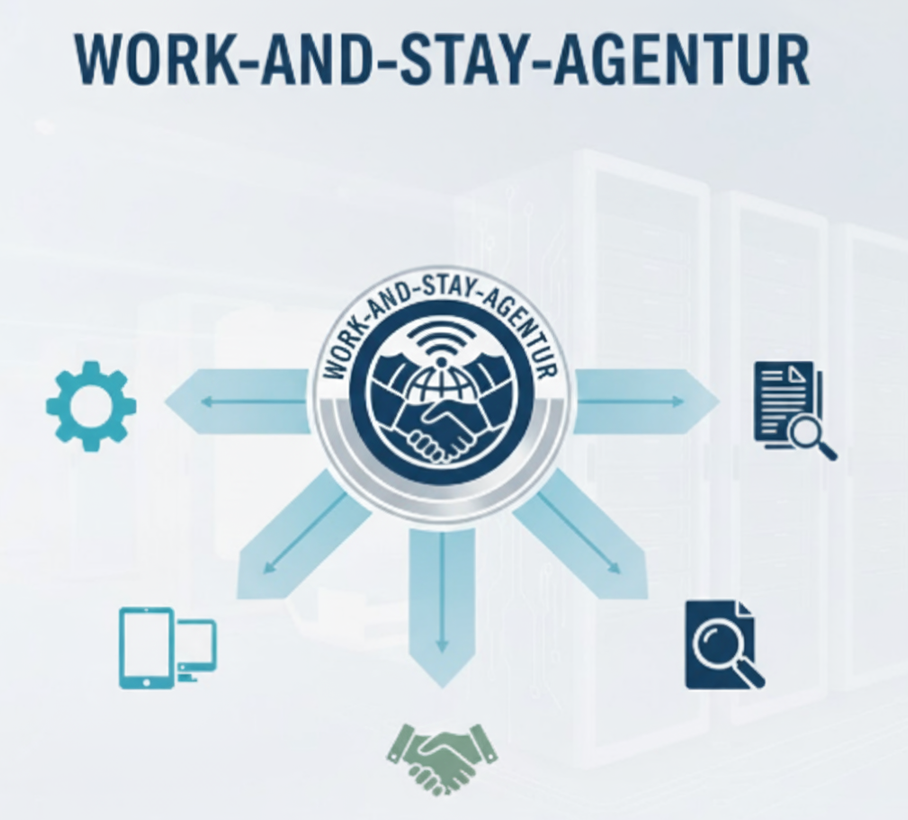The Quick Pathway to Working and Living in Germany
In 2025, Germany continues to face a high demand for qualified professionals from abroad. Whether in IT, healthcare, skilled trades, engineering, or other sectors, companies are actively searching for suitable international employees. The fast-track procedure for skilled workers (beschleunigtes Fachkräfteverfahren) is a special process that allows foreign professionals to start working in Germany faster and more efficiently. This article explains how the process works, who can benefit, its advantages, and what employers and candidates need to know.
What is the fast-track procedure for skilled workers?
The fast-track procedure for skilled workers is a legally regulated process, introduced in 2020, designed to significantly shorten the overall process from recognizing foreign qualifications and issuing visas to beginning employment in Germany. It is aimed at qualified non-EU professionals who want to work in Germany, as well as companies looking to fill positions quickly with international talent.
Unlike the standard process, the employer plays an active role: they apply for the procedure at the local immigration authority where the company is based and obtain pre-approval for employment. This centralizes the steps with authorities, so that visa processing and recognition of qualifications are completed much more quickly. The goal is to reduce the time from job offer to employment start to an average of 2–4 months.
Who can use the fast-track procedure?
The fast-track procedure is available to:
- Highly qualified professionals with recognized university or vocational degrees from non-EU countries
- Employers in Germany looking to fill specific positions
- Individuals coming to Germany as trainees, students, or for recognition of their professional qualifications
This process is particularly common in shortage occupations like IT, healthcare, engineering, and skilled trades, but it is generally open to all qualified professionals who meet the requirements.
Requirements for the fast-track procedure (2025)
The following requirements must be met:
- Concrete job offer: A signed employment contract or a binding job offer from a German employer is mandatory.
- Recognized qualification: Your foreign degree or vocational training must be recognized or deemed equivalent in Germany. Recognition can be part of the process.
- Language skills: For many professions, German language skills at least at B1 or B2 level are required. In some sectors (such as IT), English may be sufficient.
- Complete documentation: Including certificates, CV, recognition notice, proof of health insurance, and other documents depending on your profession.
- Employer’s authorization: The German employer must initiate the process with the immigration authority and present a power of attorney from the candidate.
How does the fast-track procedure work?
The procedure consists of several steps:
- 1. Employer applies: The company in Germany applies for the fast-track procedure at the local immigration authority, using a power of attorney from the future employee.
- 2. Document review and recognition: The immigration authority checks all documents and initiates recognition of qualifications, coordinating with the employment agency, recognition offices, and other authorities.
- 3. Pre-approval for employment: Once approved, the authority issues a pre-approval for the candidate’s employment.
- 4. Documents sent to embassy/consulate: All documents are forwarded to the relevant German mission abroad.
- 5. Visa appointment within three weeks: The professional receives an expedited appointment at the German embassy or consulate, and the visa is prioritized.
- 6. Arrival and starting work: Once the visa is granted, the professional can enter Germany and start work immediately.
Usually, the entire process takes only 2–4 months, which is significantly faster than the standard process that can take up to a year or more.
What are the advantages of the fast-track procedure?
- Speed: The whole process, from recognition to visa and starting work, is much faster.
- Professional support: The immigration authority actively supports both employer and candidate, coordinating between agencies.
- Priority at embassies: Appointments and processing at German embassies/consulates are prioritized.
- Transparency: Employers and applicants are informed at every stage of the process.
- Attractive for employers: Quick access to urgently needed skilled staff improves the competitiveness of German companies.
What do employers and applicants need to consider?
Despite its advantages, there are some challenges:
- Fees: The process is subject to a fee (approx. €411 in 2025, plus visa fees).
- Document completeness: Missing or incorrect documents can cause delays.
- Language requirements: German skills at B1/B2 level should be acquired as early as possible.
- Employer involvement: The process requires active participation from the employer in communicating with authorities.
- Early planning: Employers should start recruiting early to avoid delays in recognition and visa procedures.
Typical occupations and industries using the procedure
The fast-track procedure is especially popular in:
- IT and software development
- Healthcare and nursing
- Engineering and technical fields
- Skilled trades and technical services
- Research and science
Fast-track procedure for family reunification
The fast-track procedure can also be used for family reunification, so that spouses and children can enter Germany more quickly together with the skilled worker. The professional must have already completed the process successfully for themselves first.
Current trends 2025: Digitalization and improved service
More and more immigration offices are digitizing their procedures, so applications, document uploads, and communication can be managed online. This makes the process even faster and more transparent. Additional advisory services for employers and candidates are also being expanded.
FAQ: The five most important questions about the fast-track procedure
- 1. How much faster is the fast-track procedure?
Generally, processing takes only 2–4 months instead of up to a year in the standard process. - 2. Who pays for the procedure?
Usually, the employer covers the cost, but cost-sharing may be agreed upon. - 3. What documents are required?
Among others: employment contract, recognized qualification, CV, recognition notice, proof of health insurance, power of attorney from the skilled worker. - 4. What happens if the qualification is not recognized?
Without recognition, entry and employment as a skilled worker are not possible. However, you may apply for further training or qualification programs. - 5. Can trainees or students use the procedure?
Yes, those starting vocational training or studies in Germany can also use the fast-track procedure.
German language skills: The basis for integration and success
For successful integration and career advancement in Germany, German language skills are essential. They make teamwork easier, facilitate dealing with authorities, and enable participation in society. Invest in your language skills as early as possible—it really pays off!






